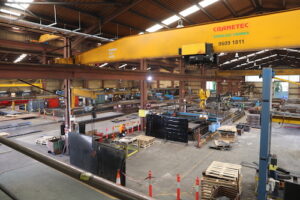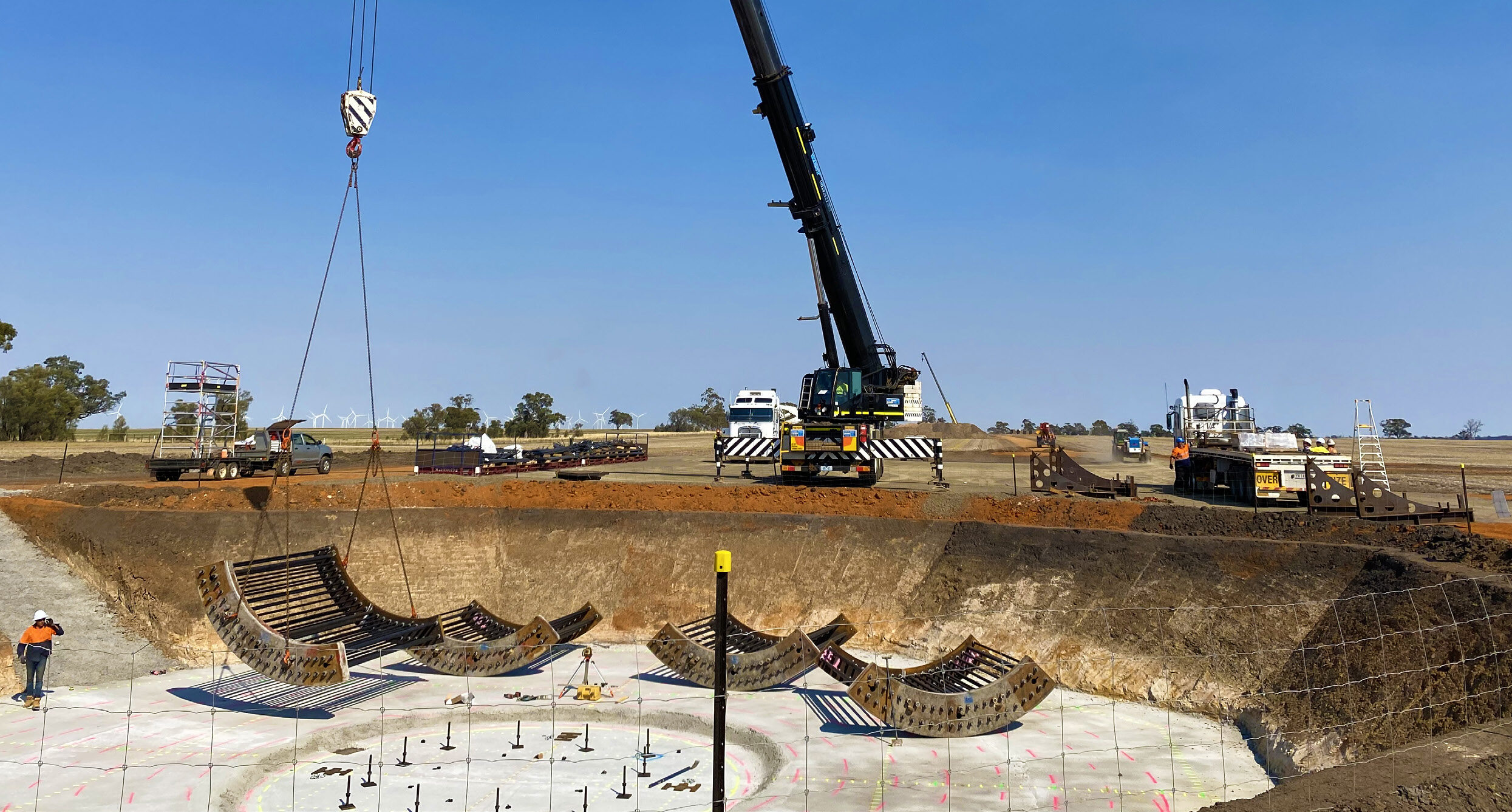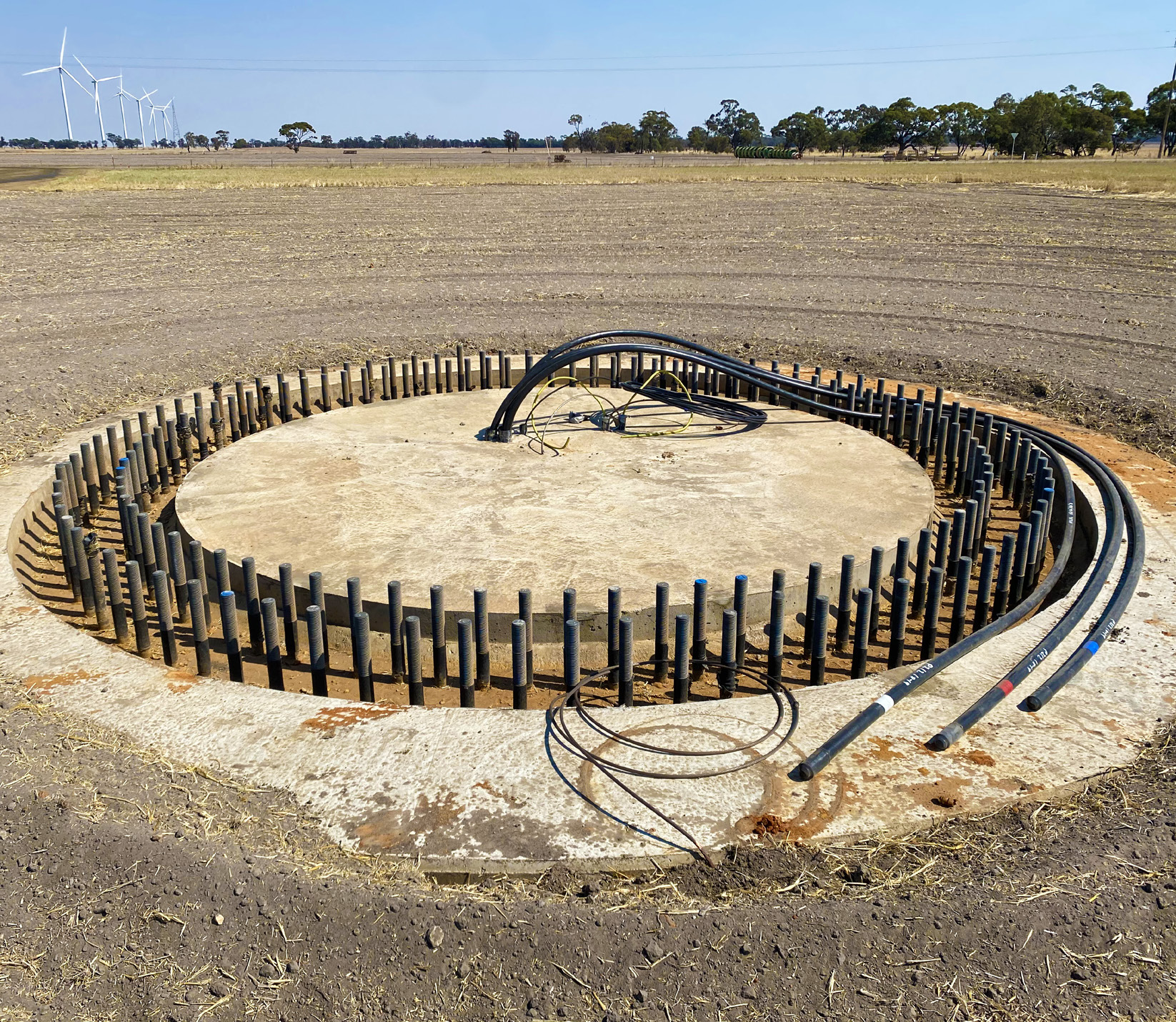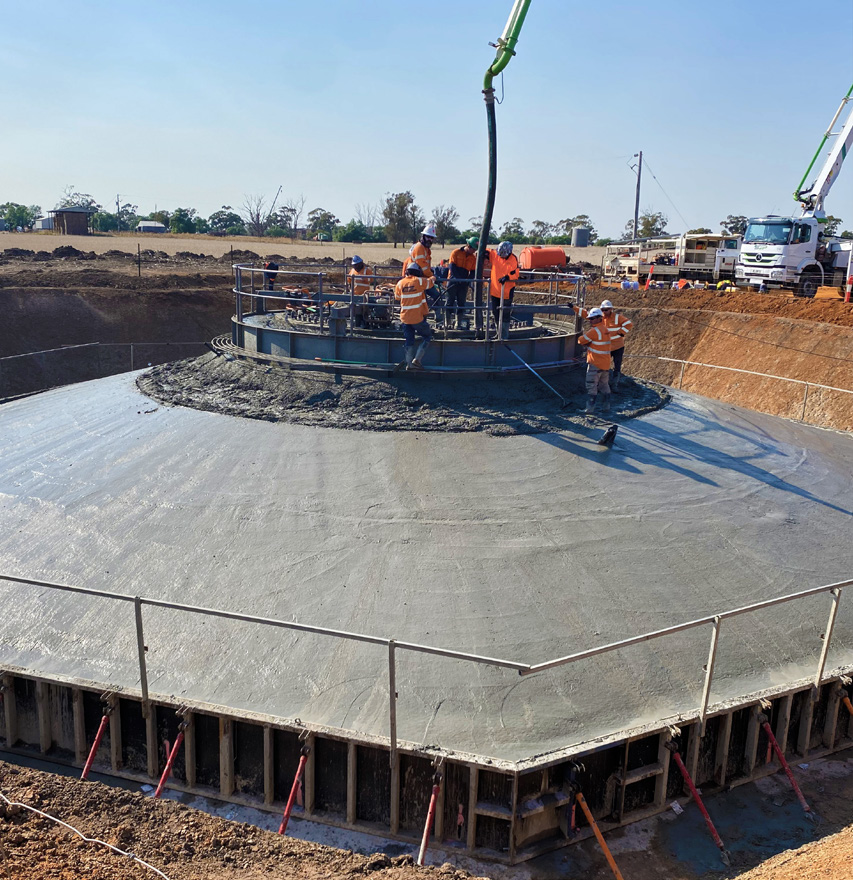MURRA WARRA II
USHERS IN THE WINDS OF CHANGE
The Murra Warra Wind Farm will play a key role in Australia’s renewable energy future. Constructed on a 4,250-hectare site some 25km north of Horsham in Victoria, Murra Warra is the first large-scale wind farm to be constructed in the Wimmera. Once complete, it will be home to 99 turbines, capable of generating 435mw. Allthread Industries delivered a wind tower anchor cage solution for the 38 turbines installed during stage two of the project.
With its low environmental impact, Murra Warra is the ideal location for a wind farm. Situated on 4,250 hectares of farmland used for sheep grazing and broadacre cropping, the footprint of the wind farm accounts for less than two per cent of the area. In addition to its minimal effects on agricultural productivity, Murra Warra was chosen for its consistently strong wind resources, close transport links, and an on-site connection to the grid network.
The Murra Warra wind farm is being developed in two stages at an estimated cost of $650 million and is expected to operate for 25 years. The construction of the $247 million stage one commenced in April 2018, and has been in operation since February 2020. Construction of stage two commenced in late 2020, and is expected to be fully commissioned and operational by mid-2022.
Featuring 38 General Electric (GE) Cypress 5.5-158 wind turbines, the Murra Warra II wind farm will generate enough renewable energy to power the equivalent of 150,000 homes in Victoria and offset around 500,000 tonnes of carbon emissions every year, playing a significant role in supporting the Victorian renewable energy target of 40 per cent by 2025. The power generated from stage two will be supplied to Australian electricity generation and retailing company Snowy Hydro under a power purchase agreement.
Murra Wurra II will provide immense benefits for the regional economy, creating more than 400 full-time jobs during the two-year construction period and ongoing employment opportunities in operations, maintenance and project support services throughout its lifetime.
The completed wind farm will feature an operations and maintenance building, four permanent meteorological masts and car parking facilities.
The Turbines
Murra Wurra II features 38 General Electric (GE) Cypress 5.5-158 wind turbines—one of the quietest systems in its class designed to operate at low to high wind speeds. The turbine blades are aerodynamically optimised and have serrations on the edges. Each blade is 70.5m long and weighs approximately 20 tonne. The weight of the nacelle is approximately 130 tonnes.
The turbines feature the next electrical system (NES) gearbox-based concept, including an asynchronous generator and a fully rated converter, which permits stable grid feed-in. Each turbine has a large rotor with a 144m diameter, delivering a nominal output of 3.7MW. The hub height of each turbine is 139m and the total height to tip is 211m.
Robust Anchor Cage Solution
Given the size, scale and weight of the turbines, a robust anchor cage solution was required; the expertise of Allthread Industries was required.
Allthread Industries supplied the anchor cages, which included large plates and 176 M48 bolts, each of which was 3.8m long and weighed 50kg.
The principle contractor for the civil works was Australian-owned Zenviron in Newcastle. According to Simon Preston (Group General Manager, Allthread Industries and Precision Oxycut), Zenviron approached Allthread Industries to quote on the anchors, which were designed by icubed (a local engineering consulting firm).
“Nick Canto, the Principal Consultant from icubed designed gravity anchors for the project. So rather than being pierced onto any bedrock, the anchor is effectively an enormous mass of concrete and steel. The sheer weight of the anchor ensures that the tower remains stable, even under the force that the wind generates,” said Preston.
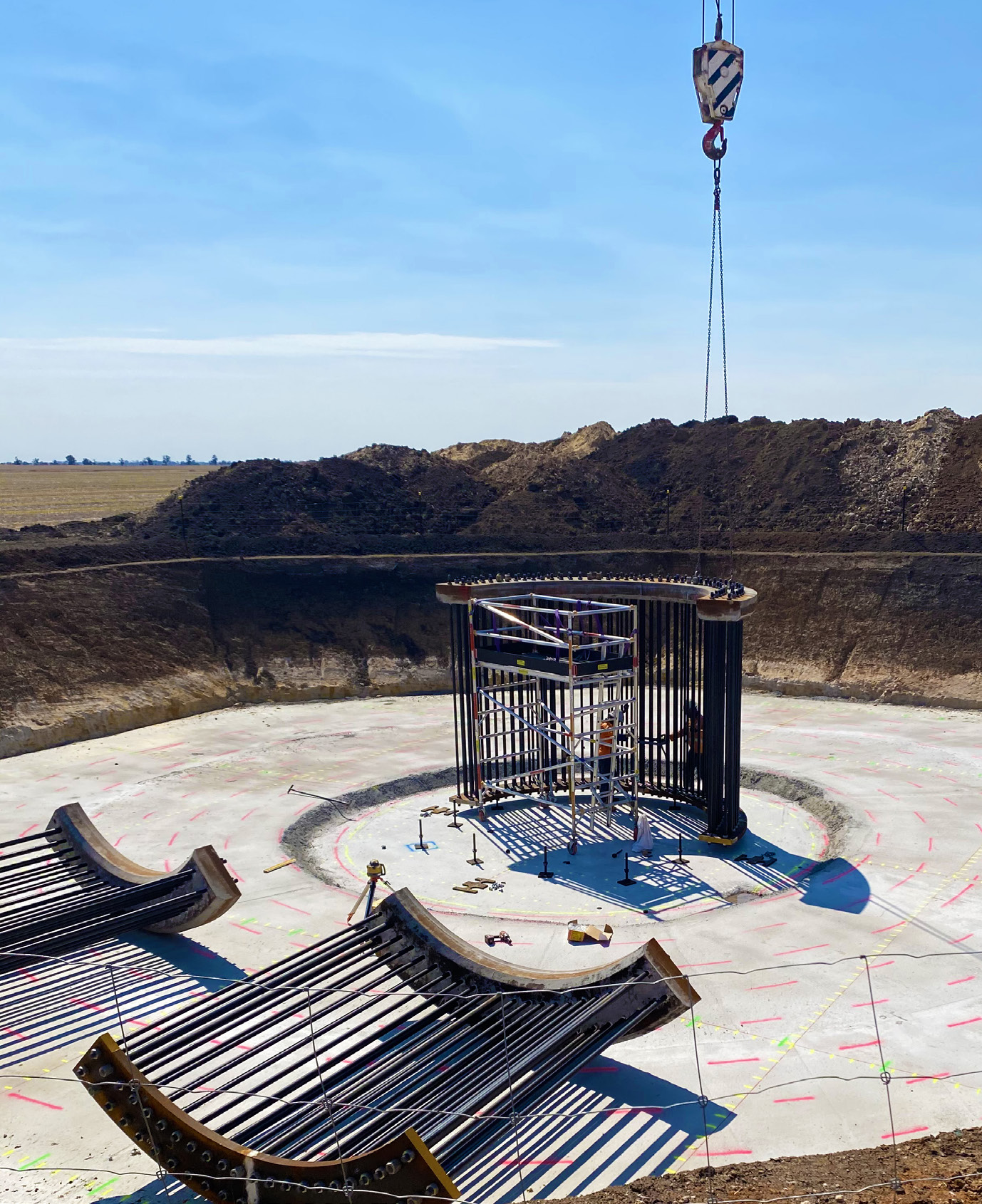
“To begin with, we were given a design to quote on, which featured an 80mm plate at the bottom. We knew our quote would be compared to overseas suppliers—that is quite common for us. While the client was keen to work with a local Australian manufacturer, we knew we’d have to sharpen our pencils.”
“On reviewing the scope, it became apparent that a key element was missing from the original tender request—the grout pocket forming ingots. These ingots form a trench that runs along the top of the foundation. When the tower is lowered into position, the trench is filled with grout so that the self-leveling material ensures that there is an even surface for a perfectly straight tower—it eradicates the danger of a Leaning Tower of Pisa,” explained Preston.
“Traditionally, the grout pocket trench is made using a set of rubberised foam ingots that is fitted around the bolts during assembly. They are quite significant in terms of size, very expensive and non-biodegradable. And they’re almost always made overseas. As the grout pocket forming ingots had been overlooked, the client asked Allthread Industries to supply these as part of the anchor cages,” said Preston.
Allthread Industries sourced prices for these rubberised foam ingots, and received quotes that were extremely expensive. In addition, Allthread Industries knew that the end result would be a significant volume of waste that simply could not be recycled and end up in land fill.
Instead, Allthread Industries investigated a more environmentally friendly alternative. This alternative called upon the expertise of their sister company, Precision Oxycut— the largest steel cutting and plate processing company in New South Wales.
“With the rubberised foam ingots, we knew we’d have to use one set per tower. They cannot be reused. They either have to be sent to landfill or burnt in the hole. The environmental impacts just weren’t right, particularly while constructing a renewable energy project like Murra Warra.”
“So, we suggested that we opt for metal reusable rings. Not only did these eradicate the environmental impacts, they gave us the benefit of being able to assemble the anchor cages in our factory and then shipping them to the site on the back of a truck.”
“We were able to provide an Australian-made solution. Our solution used all Australian steel and, on analysis, used 97% Australian content.”
Competing On Value And Innovation, Not Cost
This unique solution enabled Allthread Industries to compete with cheaper overseas imports based on the value delivered throughout the construction phase—not just on the cost of steel.
“Prior to this, we would supply the anchor cages as flat packs on the back of a truck—in exactly the same way as an overseas supplier. Because of this, we were always compared as a like for like option with international imports. The market perception was that we had an identical offering, with little differentiation. We were essentially competing based on the price of steel, and were often missing out on local contracts,” said Preston.
“Instead of that, the cost comparison had to encompass not only the cost of the steel, but the cost of getting it to site, of destuffing the container, of assembling the parts, of having workers on-site for longer in hot weather or rain or wind. With the installation of 176 bolts required, all on uneven ground, the risk to worker safety was quite high. Manual handling is always the biggest cause of injury onsite.”
“Allthread Industries was able to provide a quote that encompassed the cost of the steel plate and bolts finished and in the ground. When this was compared to the costs sighted by international suppliers, we were cost effective,” said Preston.
The total cost to buy and install anchor cage using Allthread Industries Australian-made anchors plus site labour costs was cheaper than using imported anchor cages plus site labour costs.
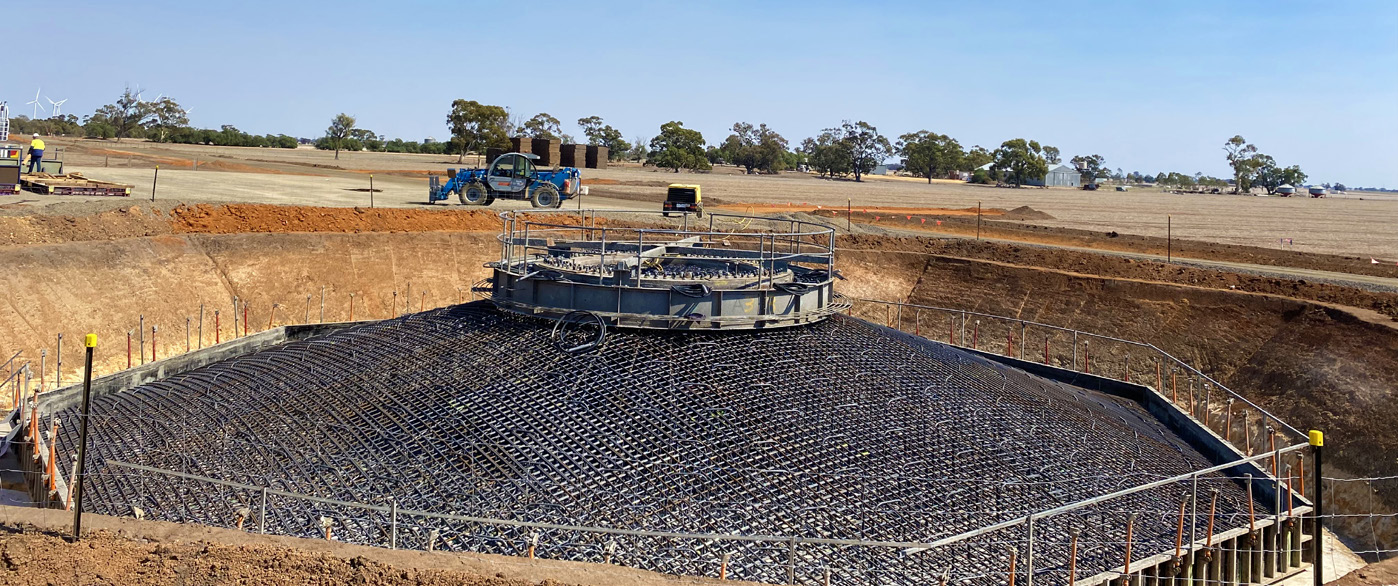
Rapid, Safe Construction
All this was completed within a compressed timeframe, with just seven weeks between the signing of the contract and delivery of the first anchor to the site.
In fact, between September 2020 and March 2021, BlueScope supplied 380 tonne of XLERPLATE® steel in AS/NZS 3678 Structural steel – Hot-rolled plates, Grade 350, 80mm thickness to Precision Oxycut. This plate was cut, milled, drilled, and tapped, to fabricate the top and bottom steel plate rings that were used to build the Anchor Cages that were housed in reinforced concrete foundation.
In addition, InfraBuild supplied 334 tonnes of 4140 grade steel that was heat treated and peeled back to rolling size by Milltech Martin Bright so that Allthread Industries could create a 10.9 grade bolt. The result: anchor cages that featured all-Australian steel.
The construction process was rapid. The average time to build each anchor cage and check positional accuracy was just 90 minutes (once the cage had been unloaded from the truck). As a result, even though the project commenced two weeks late (due to unrelated issues), the anchor cage installation was still completed three weeks ahead of the original scheduled date.
Accuracy was not sacrificed for speed though. As Preston describes it, “We also achieved far greater accuracy. We designed the top plate so that it acted as a positioning device for the bolts. We machined nuts that had a taper on them, which made it easy to get them in and out. The positioning was perfect every single time.”
“We clawed back such an enormous amount of time in the construction scheduled because our process was so much faster than anything that had been done in the past,” said Preston.
“Plus, during the construction of the anchor cages, there was not a single recorded safety incident. We solved a lot of problems regarding safety on site by using pre-slung loads. When our truck arrived on-site, it drove right up to the location of each tower. We designed a method to remove all the components off the truck without anyone having to get on the truck. This removed the risk of falling from heights,” said Preston.
An Australian-Made Solution
“We were able to provide an Australian-made solution. Our solution used all Australian steel, and on analysis used 97% Australian content. Even the plastic components were sourced from a supplier based in Orange. The only components that weren’t locally sourced were nuts and washers because there is no Australian manufacturer of those components. On our current project, the plastic components being manufactured by our supplier in Orange are now being made from plastic waste collected from the COVID-19 vaccination syringes.”
“On further analysis, we also found that our anchor cage was made up of 50% recycled material by mass. This meant that we not only had an Australian manufactured solution that was cheaper than the overseas equivalent, but also had a far higher recycled component of raw materials and therefore a lower carbon footprint.”
“In the end, the steel grout pocket forming rings that we designed to replace the non-biodegradable foam ingots from overseas were recycled back to BlueScope, and have since found their way back into full plates distributed across Australia,” said Preston.
Project Highlights
- Non bio-degradable foam ingots were not used and thus did not have to go into land fill
- Grout pocket forming rings were recycled back to BlueScope at the end of the installation project
- Anchor cage supply chain was 97 per cent supplied and manufactured from raw materials here in Australia
- During anchor cage installation, there were zero injuries and zero safety incidents for all 38 tower anchors installed
- Time to install anchor was 90 minutes using two site personnel plus crane, compared to conventional method which takes two days with six site personnel
- Zenviron regularly achieved five pours per week—a new company best for a project like this
- Project started two weeks late due to unrelated issues. Anchor cage installation still completed two weeks ahead of original schedule date
- Total cost to buy and install anchor cage using Allthread Industries Australian made anchors, plus site labour, was cheaper than imported anchor cages plus site labour costs

